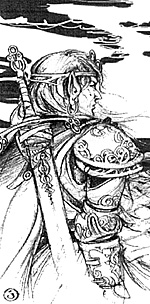 As a fresh DM, one feels the need to detail every minute of every day, mostly because (a) you
don't want to "miss anything" and if you're afraid that you'll give away when the encounters are going to happen. My view, however, is that advancing time is actually essential.
As a fresh DM, one feels the need to detail every minute of every day, mostly because (a) you
don't want to "miss anything" and if you're afraid that you'll give away when the encounters are going to happen. My view, however, is that advancing time is actually essential.
If there is a long overland stretch where you know there will be no encounters, skip over it with a well-turned phrase rather than a real-time description. Compare these examples.
Real-time: Day 1
The Players' Characters leave Greenbriar village and travel into the Soup Marsh. The actual, elapsed real time is 1 hour and 10 minutes of roleplaying getting to the edges of the swamp and having an encounter with giant beetles. There are no other encounters during that 1 hour and 10 minutes. The descriptions are top-notch and give an excellent mental image of the surrounding terrain and the weather, but after 30 minutes of the details of tracking, and the details of the organic substrate of the ground and so forth, the Players begin to wonder what the significance of all the detail is.
What would have served just as well would have been a summation similar to this: "You travel under a thick, leaden sky toward the swamp for the entire day. It is humid and hot and the Soup Marsh earns its name. By the end of the day, you are covered by mosquito bites. You find a campsite next to a huge cypress tree, and at night you are bombarded by the sounds of the mistcovered swamp - loudly croaking frogs, buzzing insects, and a underneath it all, a strange whisper dancing on the wind."
Those kind of descriptions are essential for setting mood. Indeed, skipping unnecessary detail focuses the Players on the important encounters. It is true that Players prick up their ears when they detect that you're going into detail, and they expect encounters at that point. This is a good thing; it's part of the subtle communication between the GM and the Players. If you've gone into detail the whole time, the players will never know when lightning is going to strike, so to speak. They get paranoid. I think it has to do with flight or fight syndrome. Eventually the Players become neurotic and fatigued, like a psychology experiment where randomly shocked rats become insane.
This can lead to what I amusingly call, the silly mode. I results not from a lack of enjoyment, but from fatigue Even a really serious Player can become fatigued and the game will then proceed downhill. And once you get into silly mode, it's hard to get serious again. By focussing detail on the important encounters you also focus the Players on the game. In short, good description,, capturing detail and atmosphere sets the mood, engage the players, and focuses their attention on the interactions that are truly important.
Back to Table of Contents -- The Seeker Vol. Two No. 1
To The Seeker List of Issues
To MagWeb Master Magazine List
© Copyright 2001 by Troll Lord Games.
This article appears in MagWeb (Magazine Web) on the Internet World Wide Web.
Other military history articles and gaming articles are available at http://www.magweb.com